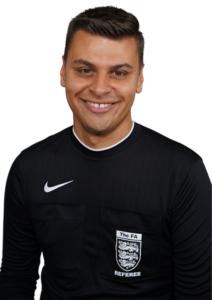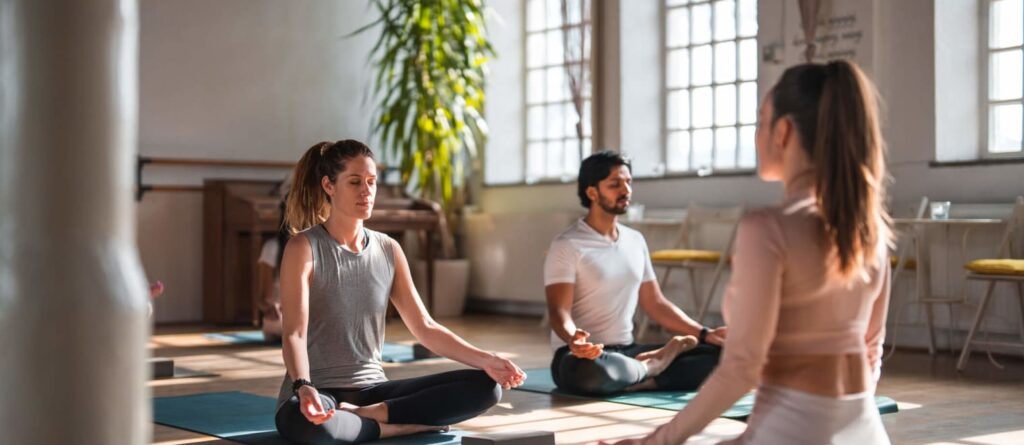As referees, we know that performing at our best requires physical training and conditioning. However, have you considered the role that your mental and emotional state plays in your success?
That’s where mindfulness and meditation come in.
I recently introduced meditation to a client in their first season officiating at a professional level. My client was refereeing in Sweden and dealing with a lot of anxiety and negative beliefs at the time. The client officiated their first 2 games of the season and described their performance as “Terrible”. They were nervous that the dream they’d worked so hard for, of refereeing at a professional level, was going to be cut short because of their crippling anxiety. The client was bombarded with negative thoughts of not feeling like they were good enough to be at the new level and spiraled into thinking that they were going to be demoted because they were officiating so badly. They knew they had to do something to turn things around for themself. When I began to consider ways to calm the anxiety of my client and improve their onfield performance, I decided that I would do some short guided meditation with them to see if that would help at all.
This produced fantastic results for the client.
From this point onwards, my client started with 5-minute guided meditations before training and on matchdays and, over time, increased their meditation time to 15 minutes before training and on matchdays, once they got the hang of it. Having a meditation practice can help you develop a stronger mental game, manage stress and anxiety, help with your decision-making in critical moments in games, and ultimately optimise your overall refereeing performances.
In this Blog, I’ll explore the ways that mindfulness and meditation can benefit officials and I’ll provide practical tips on how to incorporate these practices into your training sessions and on matchdays.
First, we’ll dive into the science behind mindfulness and meditation and how they impact the brain and body. Then, we’ll dive into the specific benefits for referees, such as improved focus, enhanced recovery, and decreased injury risk.
Finally, I’ll provide actionable tips and techniques for incorporating mindfulness and meditation into your daily routine, both for officiating and in daily life.
So, whether you’re a professional referee or a Sunday morning whistler, let’s explore how mindfulness and meditation can help you reach your full potential! The only regret of my clients, regarding meditation and mindfulness, is that they wish they’d started in their school years!
As an official, it’s easy to get caught up in the physical aspect of refereeing, training hard, pushing your body to the limit, and striving for peak physical performance. I hear you. I used to just focus on the physical aspect of officiating too. But what about our mental game? Our mindset and emotional state can have a huge impact on our ability to perform at our best.
This is where mindfulness and meditation come in. These practices have been used for centuries to promote inner peace, focus, and clarity of mind. By implementing mindfulness and meditation into your training sessions, you can train your mind to be just as strong and resilient as your body. Who doesn’t want that?!
So How Exactly Do Mindfulness And Meditation Improve Refereeing Performance?
Improves focus and concentration: Mindfulness and meditation teach you how to stay present and focused in the moment, rather than getting distracted by outside factors (comparing yourself to colleagues) or internal chatter (negative self-talk, beating yourself up for mistakes) This can help you stay focused on your goals in the moment and ultimately perform at your best on the field of play.
Reduces stress and anxiety: As fun as refereeing can be, it can also be stressful and anxiety-inducing, especially when you’re under pressure to perform. Mindfulness and meditation can help you manage your stress and anxiety levels, slow your breath and thoughts, and allows you to stay calm and focused even in high-pressure situations.
Enhances mental toughness: Mindfulness and meditation can help you develop greater resilience and mental toughness, allowing you to bounce back from setbacks and challenges more easily. This can be especially helpful when you’re facing tough periods of form or setbacks in your training sessions. The ability to let go of mistakes and recover quickly is key for great performance.
Promotes recovery and injury prevention: Mindfulness and meditation have been shown to have a positive impact on physical recovery and injury prevention. By reducing stress and learning to work with your thoughts (rather than fighting or ignoring them) improves overall mental wellbeing, When we are mindful and in tune with our body and what it needs, we can focus on rest and recovery more so than if we are tuned out to the message that our body sends us. If injuries do happen (they’re a part of the officiating) having a meditation practice will help you manage your anxiety, racing thoughts and help you focus on what you CAN control (Your rehab, attitude, and effort toward your recovery) 😉
So, How Can You Incorporate Mindfulness And Meditation Into Your Training Sessions? Here Are A Few Tips To Get Started:
Start small: You don’t have to meditate for hours on end to see the benefits. Start with just 5 minutes a day before training and on matchday and gradually build up your practice over time. So maybe that would look like increasing from one 5-minute meditation a day to two 5-minute meditations a day (or 1 longer 10-minute meditation) You can also start small by making a list each night of what emotions popped up for you during the day and where in your body those emotions might be showing up for you. Give yourself permission to let those emotions go just for the night. This exercise helps us release negative emotions before sleep which can help with sleep and reduce anxiety, thus helping with performance.
Find a quiet space: It can be tough to quiet your mind when you’re surrounded by noise and distractions. Try to find a quiet space where you can meditate without interruptions. If you are not driving, car journeys can be the perfect time to throw in your headphones and listen to a guided meditation.
Use guided meditations: If you’re new to meditation, it can be helpful to use guided tools, you can train your mind to be just as strong as your body at being resilient, and capable of handling stress.
Make it a habit: Consistency is key when it comes to mindfulness and meditation. Try to practice daily or at least a few times a week to see the most benefit. Set an alarm. You can also practice mindfulness by limiting your screen time during your day. Reducing screen time (even just by 30 min each day) helps us be more present in whatever activity we are participating in. Start small. Try turning your phone upside down or on Do Not Disturb while you eat your next meal. Notice how the food feels as you’re eating it. What are you smelling? What textures are there? Are you getting full? Mindfulness is just paying attention, without judgment to what is happening in our mind and environment. Mindfulness and meditation can be powerful tools for referees looking to optimise their mental and officiating performance. Start incorporating these practices into your training sessions and look out for the changes you start to notice!
Until next time! Be Well & Stay Mindful
At The Third Team I work individually and in collaboration with different professionals where I have developed workshops and 1-2-1 sessions associated with Resilience and Mental Toughness Development to help referees. The workshops and 1-2-1 sessions are interactive, where referees are encouraged to open up and share their experiences to help themselves and each other.
Feel free to contact me if you’d like to know more about my workshops or 1-2-1 sessions and how I could help you or your officials.
Best Wishes,

Nathan Sherratt
Referee Educator & Managing Director of The Third Team

Nathan Sherratt
Nathan Sherratt, Referee Educator, Resilience Trainer and Managing Director of The Third Team. A Mental Toughness Practitioner based in Tyne & Wear, North East England.

